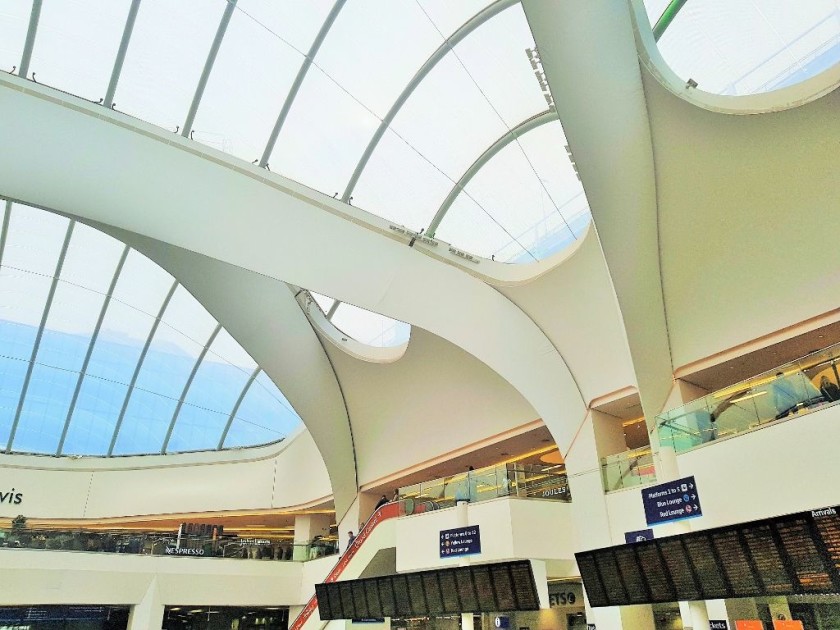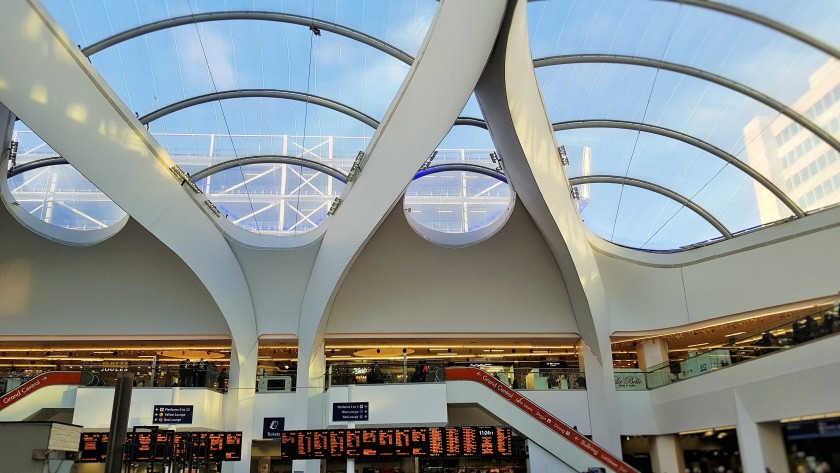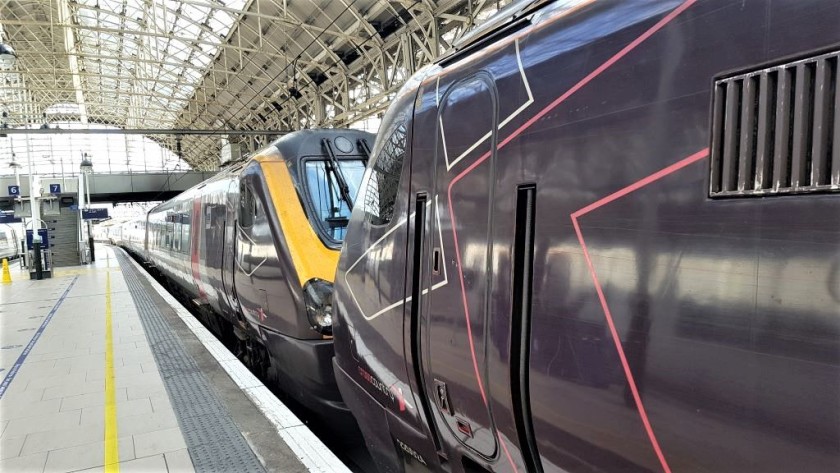Related Content
Content
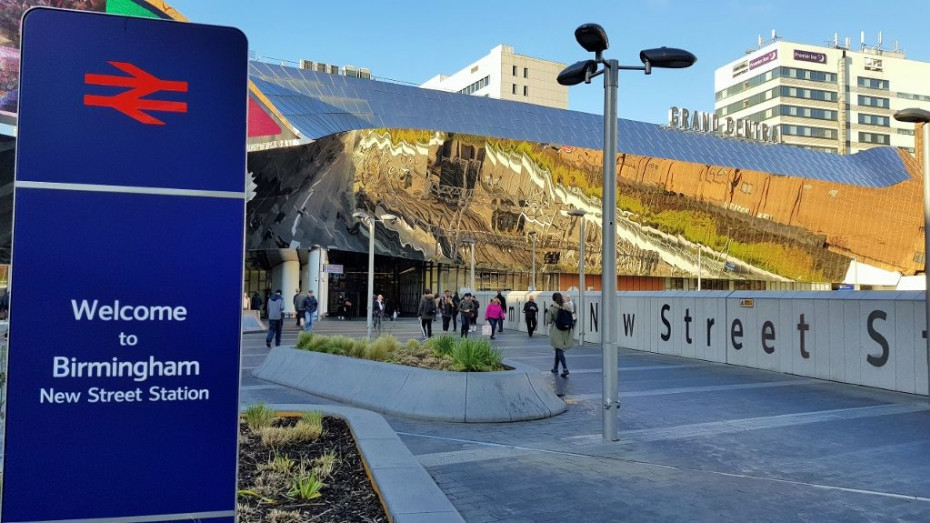
Birmingham New Street (Birmingham)
This guide to taking trains from and to Birmingham New Street focuses on the less obvious aspects of arriving and departing from this station by train.
It encompasses a weight of detail, because how to take a train from Birmingham New Street is distinct, from any other station ShowMeTheJourney has ever used.
Share
At a Glance
Services
Left Luggage
Travel Information Desk
First Class Lounge
Onward Travel
Metro
Taxi Rank
Accessibility
Step Free
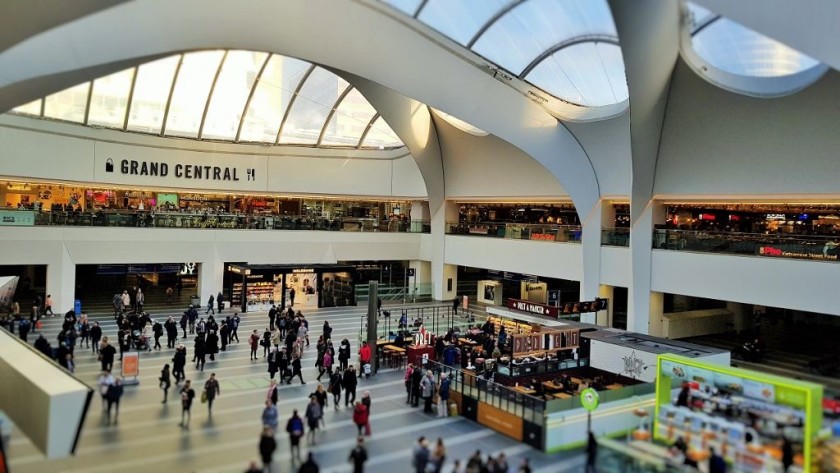
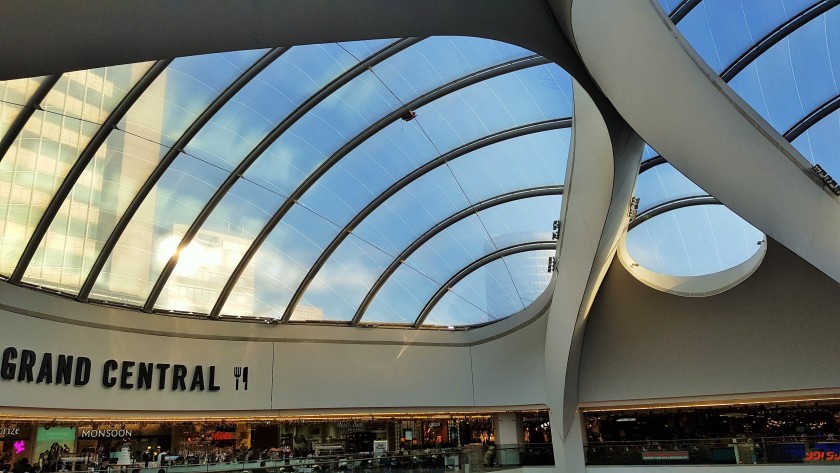
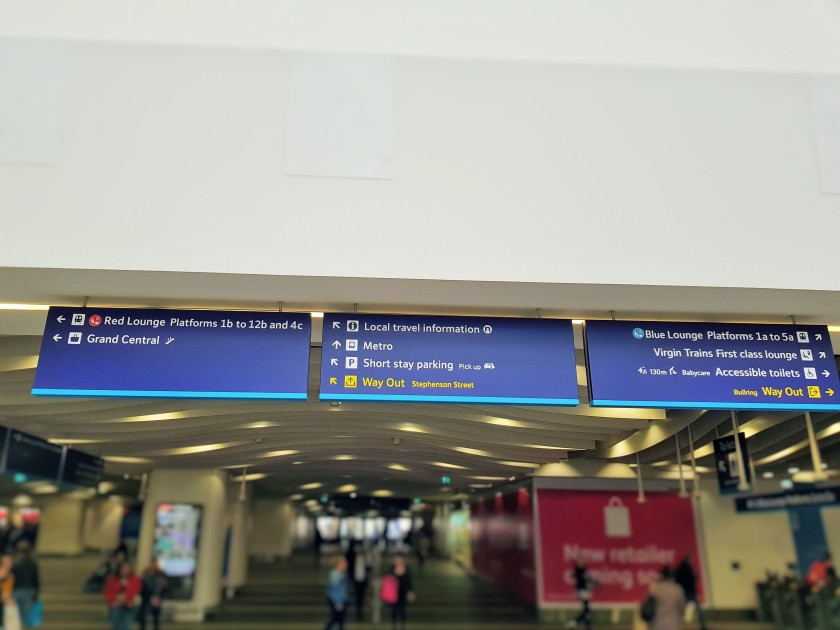
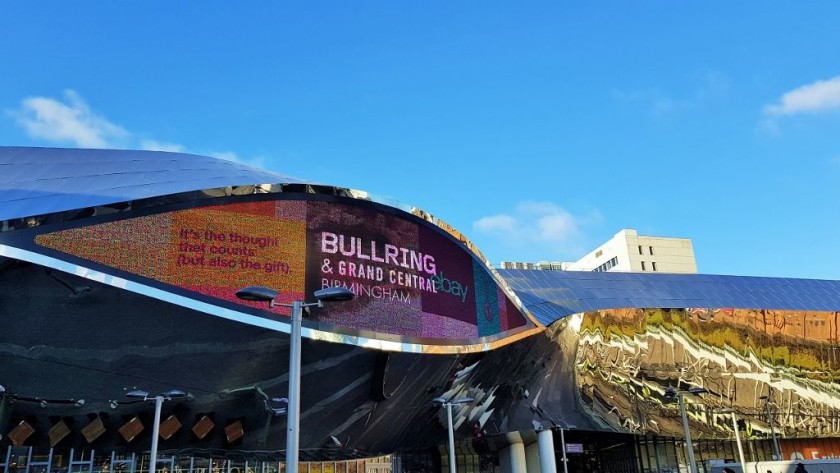
Train services summary:
Summary of the long-distance train services from Birmingham New Street:
|
Train Operating Company: |
Destinations and routes: |
|
(1) London via Milton Keynes – the fastest trains between Birmingham and London (2 or 3 x trains per hour) |
|
|
(1) Edinburgh via Derby, Sheffield, Leeds, York, Durham and Newcastle (hourly) |
|
|
(1) London via Northampton and Milton Keynes (slower than the Avanti Trains) (2 x trains per hour) |
|
|
(1) Hereford via Worcester and Great Malvern (hourly) |
|
|
(1) Aberystwyth and Pwllheli via Barmouth via Shrewsbury and Welshpool (every other hour) |
Birmingham’s main station New Street has a fabulous location in the heart of the city, made possible by the fact that the part of the station that the trains use is below street level, so trains travel through tunnels beneath the city centre in order to access the station.
And it’s a great building from which to take a train, as the station now shares its location with a very smart shopping mall named ‘Grand Central’.
When the trains can't be seen from the concourse, the routes to them are always slightly trickier, though at Birmingham New Street there are also multiple access points to and from the trains.
These are ideal for its regular users, but a tad bewildering if you have never previously taken a train to or from here.
Good to know:
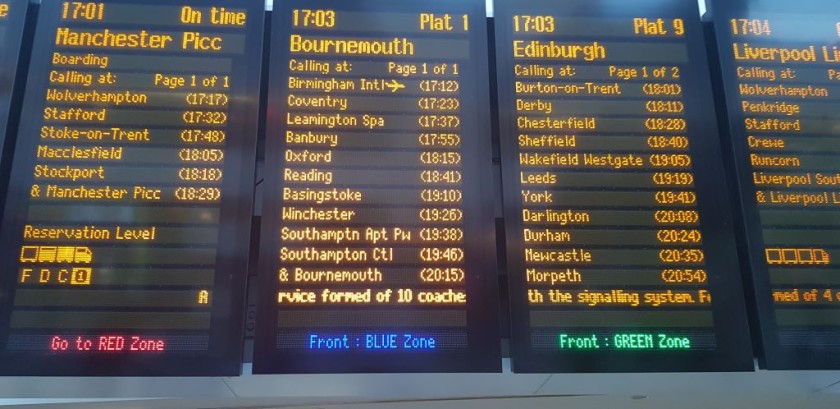
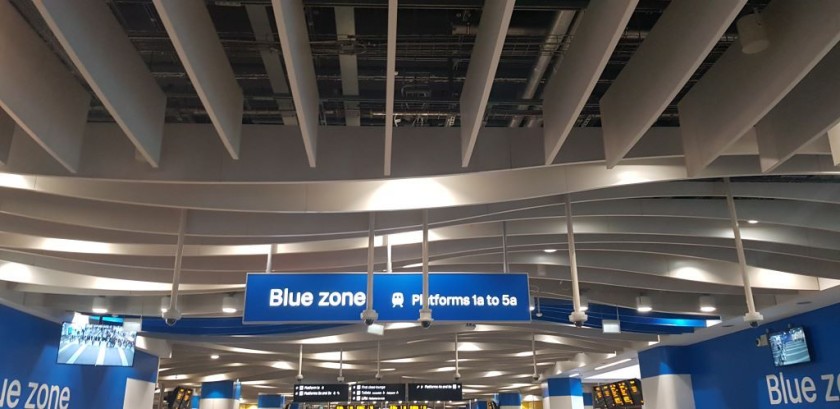
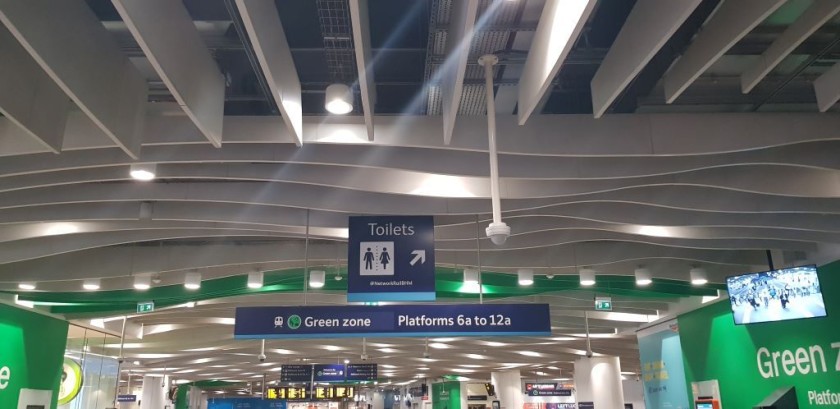
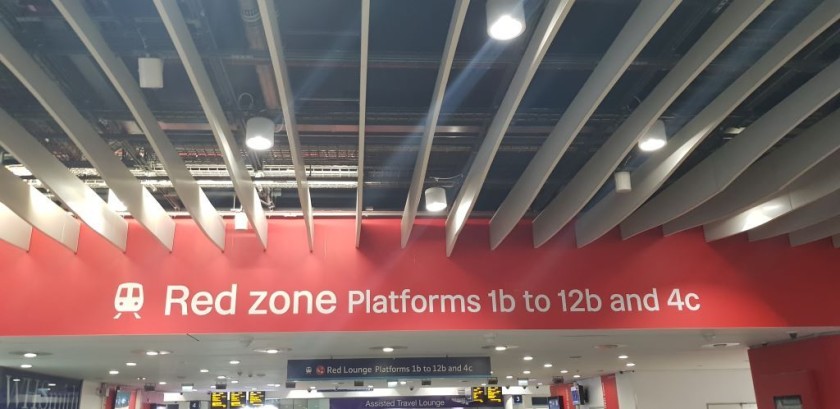
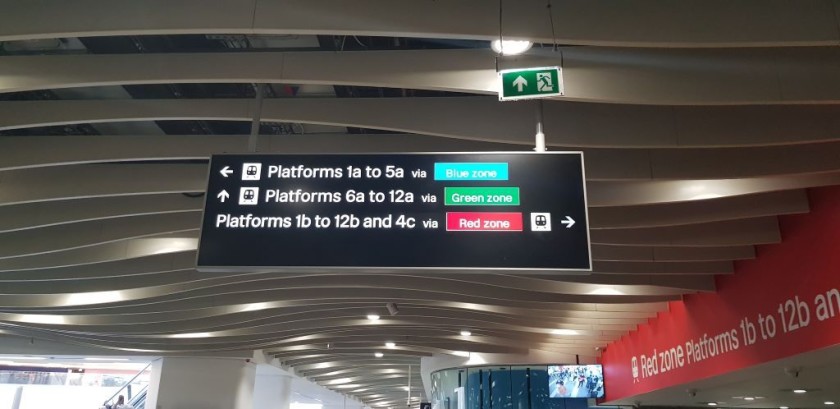
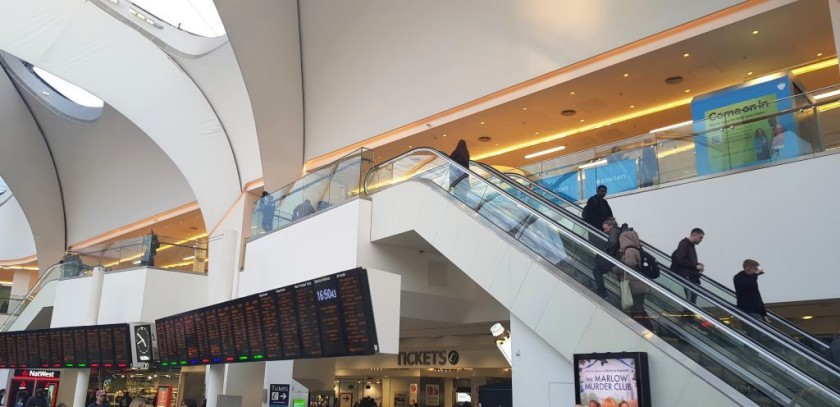
ShowMeTheJourney’s guide to using Birmingham New Street may seem somewhat eccentric with its references to ‘a’s and ‘b’s and multiple 'zones’; but trust us we have tried hard to help you make sense of what can initially seem a complex space.
To that end - the ten key things worth knowing about Birmingham New Street station are:
(1) The 12 platforms (tracks) are divided along their lengths into ‘a’ and ‘b’ sections – meaning that most trains depart and arrive from a specific ‘a’ or ‘b’ platform.
On the departure screens for each ‘Plat’ (track) you will usually see the likes of 6a and 11b etc (and there is also a platform 4c).
Though the longer trains, including the Avanti West Coast trains to and from London use the full length of the platform (track), thereby occupying both the ‘a’ AND the ‘b’ sections, so for these departures and arrivals, only the number is used.
(2) When you’re on the platform, if the ‘a’ or ‘b’ sections are at the opposite end to where you find yourself, you can simply walk along it towards them, they’re a matter of steps apart - so it doesn’t particularly matter how you access each platform, as long as you’ve got the number right.
The platforms at Birmingham New Street aren't exceptionally long.
(3) The station is in effect divided into four parts, the main concourse and the three ‘zones’ - the Blue, Green and Red.
The main concourse is also in effect the ground level of the Grand Central shopping mall, on one side of which, behind the main departure board, is the ticket office.
However, to access the trains from the main concourse, or the passages that lead to/from the multiple entrances, you have to pass through one of those three zones; each of which provides the optimum access to different sets of platforms (tracks).
- Blue = to 1a - 5a
- Green = to 6a to 12a
- Red = 1b to 12b and 4c.
(4) It’s these zones which makes using New Street station different from the norm.
An assumption is made that you’ll know what their function is, but if you are first time user of Birmingham New Street, you won’t have encountered this method of navigating a station.
What can be a tad confusing, is that on the smaller TV style departure screens you won’t see any information on them, which will say something along the lines of ‘go to the Blue zone' etc.
Though at the bottom of the listing for each departure over on the main board, you will see indicators of whether you should access the trains through the blue, green or red zones.
(5) These zones function in a similar way to the gates at an airport, they’re interim locations in which you can spend time waiting for a train to depart, once you know from which platform (track) it will be leaving from.
They have seating areas labelled as 'lounges' which are accessible to all ticket holders - there is also a First Class lounge in the Blue Zone for users of Avanti West Coast 1st class tickets.
(6) Because the Blue and Green zones in effect give access to two different sets of tracks, when the normal pattern of departures is operating, what may be useful to know is that the long-distance trains typically use these sets of platforms:
- 1 to 5 = the Avanti West Coast trains to London; LNWR services to London and Liverpool; the West Midlands Trains to Shrewsbury and the CrossCountry trains to Bournemouth.
- 6 to 12 = the CrossCountry trains to all other destinations including Bristol, Cardiff, Edinburgh, Manchester and Nottingham; the TFW trains to Aberystwyth and Holyhead, the West Midlands Trains to Hereford and most of the Avanti West Coast trains to Blackpool, Edinburgh and Glasgow.
(7) There are ticket gate lines which separate the lounges from both the concourse and the main entrance to the station on Smallbrook Queensway.
If you enter the station from Smallbrook Queensway, the Blue Zone is over to the right and the Green Zone is over to the left.
There are departure screens just inside this entrance, so you can use them to check which platform (track) your train will be leaving from and then go directly to the respective lounge: Blue = platforms 1-5; Green= 6 – 12.
(8) Though once you have used your train ticket to access a zone by opening a gate, you cannot use it again to re-open a ticket gate in order to head back to the main concourse or another part of the station.
Though when the ticket gates are in operation they are always staffed.
(9) The station toilet (rest room) facilities are located in each of the three zones
Why do you need to know this?
You ideally need to have checked which platform (track) your train will be leaving from, before you use these facilities; because you will need to pass through the ticket gates in order to access them and your ticket won’t then re-open the gate.
So if need be, you'll need to ask staff to open the barriers if you want to head back to the main concourse,
If you don’t yet know which platform (track) your train will be leaving from, enter the Red Zone and use the facilities there, as from that part of the station, you’ll then be able to subsequently access any platform (track) that the trains leave from.
Or there are alternative (rest room) facilities on the level above the station in the Grand Central shopping centre, best accessed by taking the escalator which is just inside the Stephenson Street entrance.
(10) Because the platforms (tracks) are below street level, escalators, lifts (elevators) AND stairs connect the Blue and Green Zones to the platforms (tracks).
However, the Red Zone is only connected to the platforms (tracks) by escalators and lifts.
Questions Answered
ShowMeTheJourney has anticipated what questions are most often asked about taking trains to and from Birmingham New Street station and answered them below.
If you can't find the information you are seeking, you can ask a question and the AI enabled service will try to write an answer, telling you what you wish to know.
Is there step-free access to and from the platforms / tracks?
Yes, despite the part of the station that the trains use, being below street level, the platforms / tracks are accessible by escalators and lifts / elevators.
When arriving by train, taking the stairs may seem to be the most obvious route to the exit, but step-free alternatives will be available.
How to travel between Birmingham New Street and the city centre
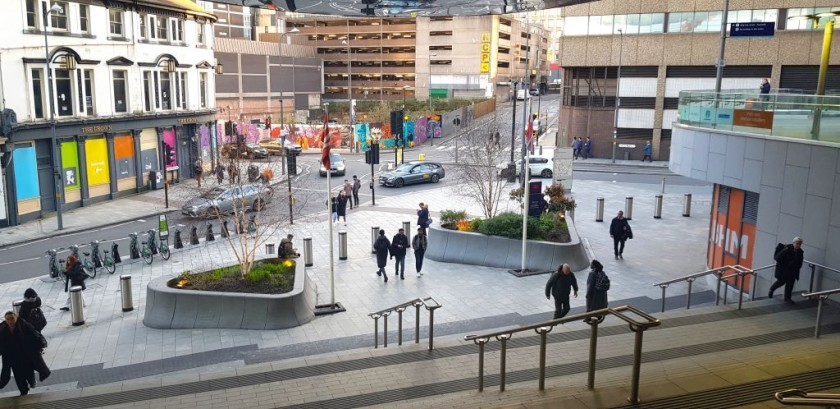
Birmingham New Street has a fabulously convenient location, within a 10 min walk it's possible to access the multiple attractions in the Centenary Square area - including the Symphony Hall, the Sea Life Centre and The Ikon Gallery.
Also within a 10 min walk is the Birmingham Back-To-Backs Museum and the Birmingham Museum and Art Gallery.
Though it's worth checking the route to your final destination in the city, as there are 3 main exits from New Street station.
the Smallbrook Queensway entrance / exit
The taxi rank is located here and it also opposite the Bullring Shopping Centre - Though if you want to head into the Bullring, there is a covered walkway available from Level 1 in the main concourse (Grand Central) area of the station.
.
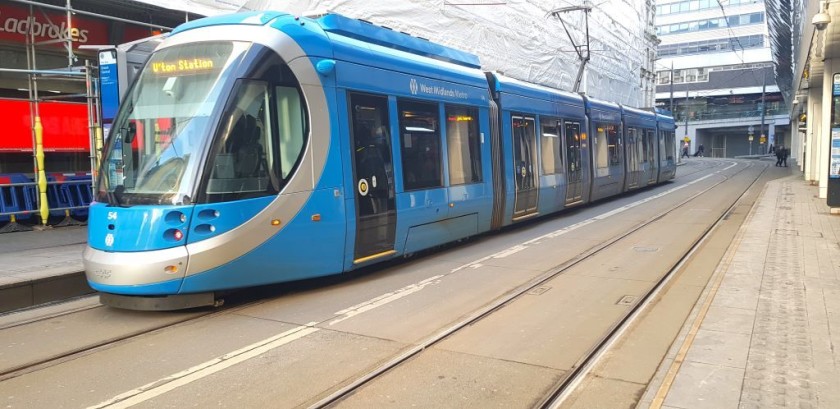
the Stephenson Street entrance / exit and taking the Metro
If you are heading to heart of the city centre, it’s likely that you’ll want to you use the exits on to Stephenson Street.
To the left of this exit is the Local Transport information office, which can be a big help with working out which local bus route (line) will take to your final destination and which stop it will be leaving from.
The easiest pedestrian route to the Centenary Square area is:
- Turn left on exiting the station and follow the tram tracks around to the right.
- Walk across Victoria Square (where the city's Christmas market is staged)
- Head to the right of the Town Hall
- Take the Centenary Path footbridge over the main road and Centenary Square will be ahead of you.
Or take the Metro branded tram two stops to the stop named Library.
The tram stop at New Street station is named ‘Grand Central’ and it is just outside the Stephenson Street exit.
On the station concourse look for the signs pointing the way to the ‘Metro.’
If you want to take the tram - it’s also the easiest means of accessing the Snow Hill area on the northern edge of the city centre), you can pay the conductor on board, a central zone ticket is £2.

For the southern side of the city centre, use the appropriately named Southside exit on to Station Street.
At this exit you don't have to use the stairs - from the top of the stairs you can head to the right, by the Wetherspoon's pub, to find the lift down to street level.
Taking a local train
Although some destinations in the city are most easily accessed from New Street by local train – University station lives up to its name with access to the University of Birmingham and Bourneville station is by Cadbury World.
Are there cafes or restaurants available?
There are numerous food and drink outlets within the building that houses the Birmingham New Street station concourse, but the only options for a full meal service are the two pub chains - an All Bar One and Wetherspoons
Are there left luggage facilities?
Yes, there is a facility managed by The Excess Baggage Company, it located between the Stephenson Street entrance and the Green Zone.
Does the station have a First Class lounge?
There is a lounge in the Blue Zone which can be used by holders of First Class tickets to travel by the Avanti West Coast trains.
Departing by Train from Birmingham New Street
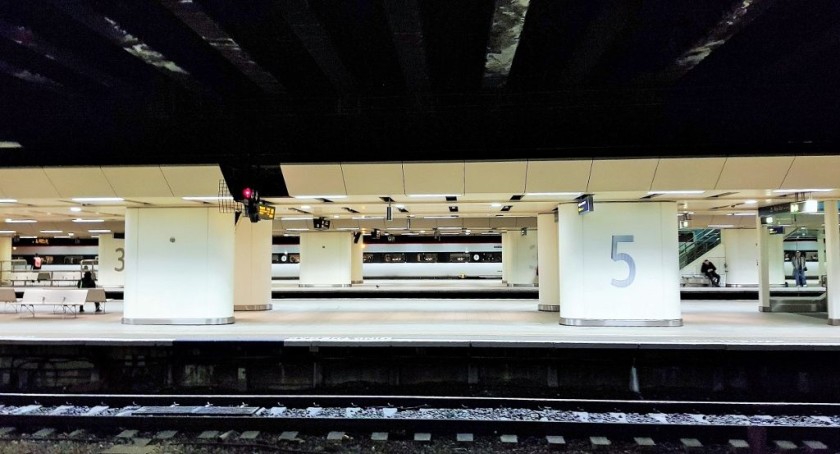
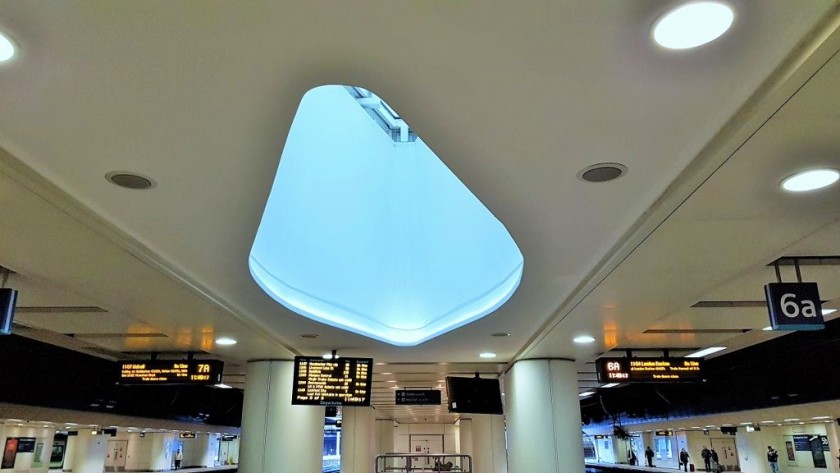
The specific platform (track) that each train will be leaving from, is normally shown on the departure screens, as soon as the details of the train appear.
However, because so many trains leave in every hour from New Street, only the trains departing in the next 20 – 30 mins will usually be visible.
So if you arrive at the station more than 30 mins before your train is due to leave, the best place to wait for a train can be in one of the many food and drink outlets, or one of the seats on the main concourse - a big plus of using New Street is the volume of seats in the station.
Though most of the seated waiting areas are located behind the ticket gates, in one of the three lounges, that travellers have to pass through when accessing a train.
However, once you have used your ticket to open a ticket gate and enter a lounge, you can’t then use it again to re- open the gates and go back into the main station - though you can explain the situation to the ticket zone staff
Keep this in mind, particularly if you’ll be accessing the trains by using the Blue and Green zones, as these two zones house limited catering options and no shops.
In contrast the Red zone has more food/drink options and a branch of WH Smiths, where you can buy something to read on your journey.
Although no matter which part of the station your train is leaving from, it’s best not to make your way down to the specific platform until 5 – 10 mins before your train is due to depart.
The seated waiting areas in the ‘lounges’ are more comfortable and less chaotic locations, in which to wait for a train than hanging around at platform (track) level.
Accessing the trains:
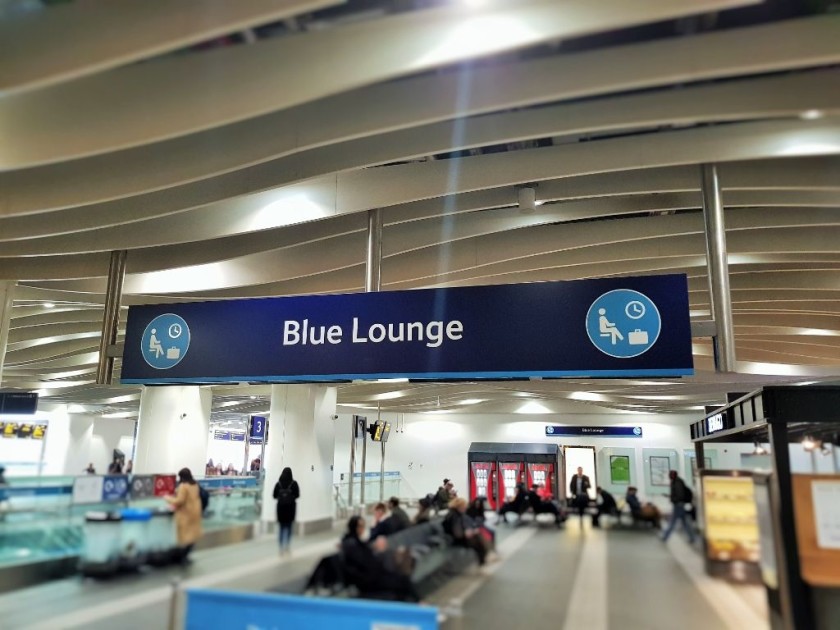
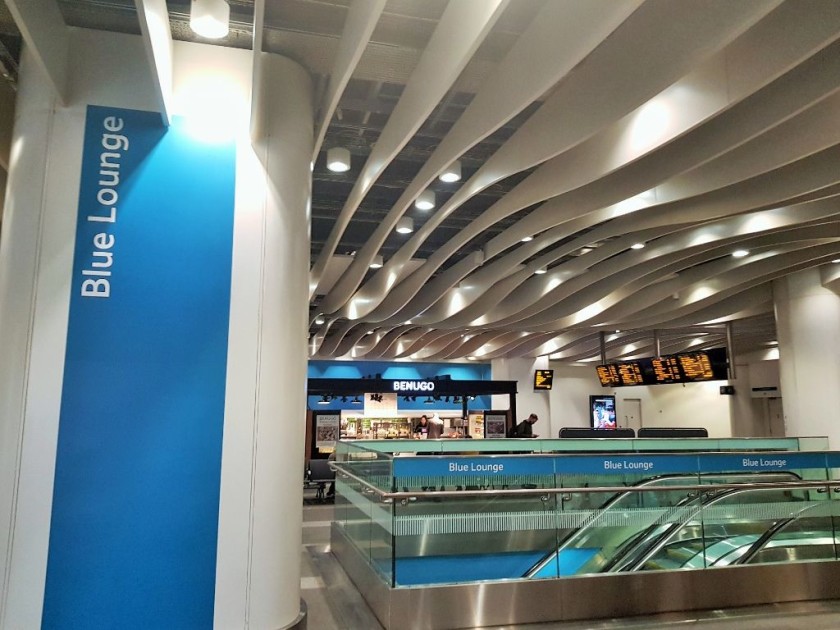
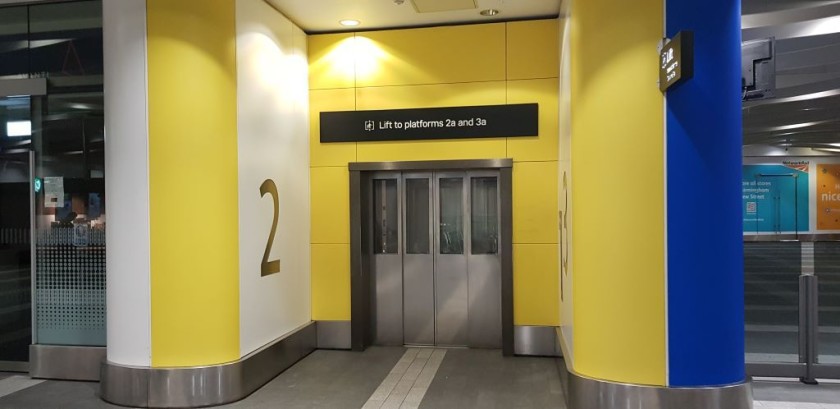
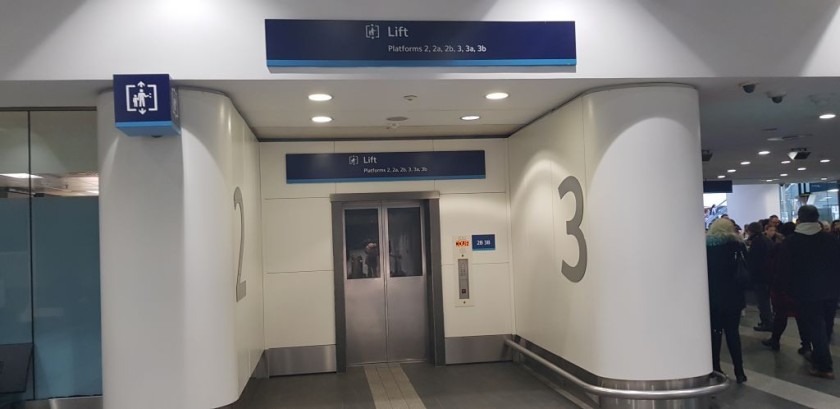
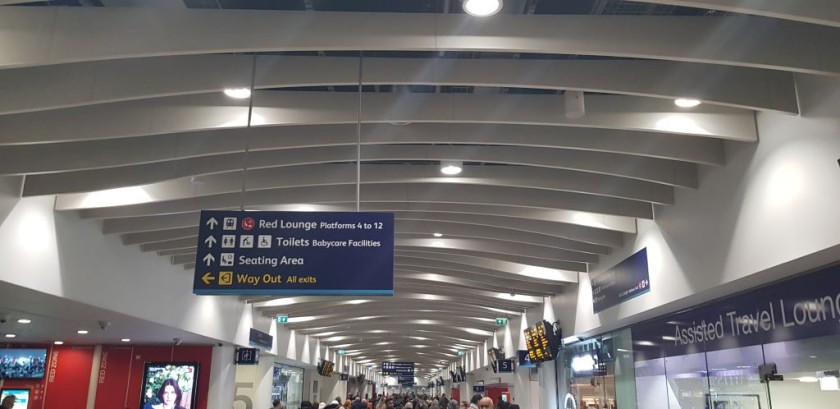
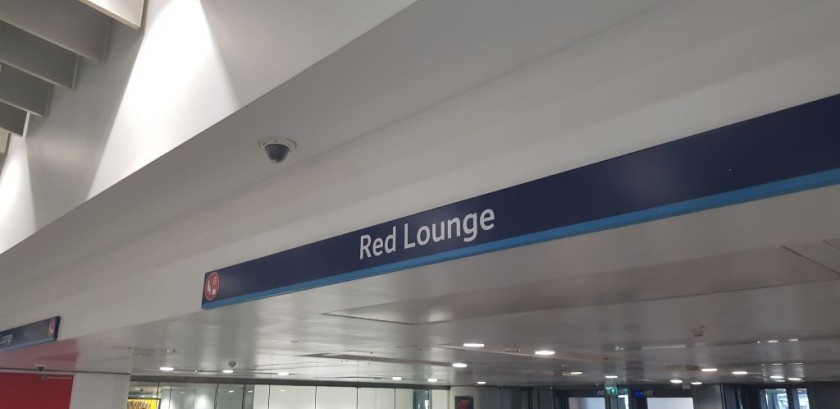
On the main main, larger boards, the departure info will indicate that you should head to the blue, green or red zones - and there are now signs on the concourse pointing the way to each zone.
On the smaller TV style departure screens the ‘Plat’ that each train will be leaving from will either be indicated solely a number, OR by a number AND a letter – 2a, 10b, 7b etc.
When using the station for the first time, what won’t be particularly obvious, is that you’ll need to pass through one of the three ‘zones’ at the station in order to access the platforms (tracks) that the trains leave from.
The Blue zone:
It is to the right of the concourse and is the quickest route from the main concourse to the ‘a’ ends of platforms (tracks) 1-5
Stairs and lifts (elevators) are available to all platforms and 2a to 5a can also be accessed by escalators
If you were looking at the main departure board on the main concourse, facing the ticket office, the ticket gates for this ‘Blue zone’ would be behind you and over to the right.
The Green zone:
If you were looking at the main departure board, facing the ticket office, the ticket gate lines for this ‘Green zone’ would be behind you and over to the left.
Using it the quickest route from the main concourse to the ‘a’ ends of platforms (tracks) 6-12, all of which can be accessed from the green zone by escalators, stairs and lifts (elevators).
The Red zone:
The two ticket gate lines which gives access to The Red zone are on either side of the ticket office, behind the main departure board.
You can access all of the platforms (tracks) in the station from this Red Lounge, but it is the quickest route to the ‘b’ ends of the platforms (tracks) 1 - 12 – and also to 4c.
The Red zone is in effect a passage way across the station and it is only connected to the platforms by escalators and lifts (elevators) and not by stairs.
The escalators are on one side of the passage way and the lifts are on the other.
If you want to use the stairs to make your way to a train, you will need to use the Blue zone to access platforms 1-5 and the Green zone to access platforms 6 – 12.
Then if need be you can move along each platforms to access the ‘b’ zones/ends.
Boarding a train:
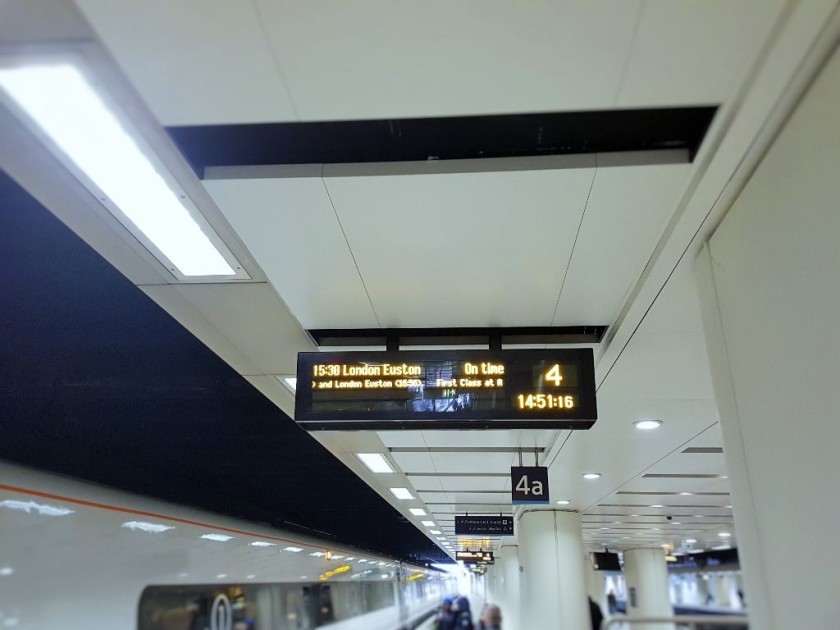
Once you’re on the platform (track) you will see numbers small and large which will tell you the number of the platform you are on, but what are a tad less obvious are the signs that will tell you which specific part of the platform you are on; the ‘a’ end or the ‘b’ end.
But once you on the platform (track), you can easily move between the ‘a’ and ‘b’ ends, they are just steps apart.
The ‘a’ and ‘b’ ends of the platforms have separate departure indicators as many trains only depart from the ‘a’ or ‘b’ sectors.
It’s why, if you’ve seen 2a or 10b etc on the departure indicators, you then need to be waiting on that specific end of the platform (track), for your train.
You can confirm that you are waiting for and boarding the correct train because its departure details will be shown on the specific ‘a’ and ‘b’ departure indicators.
Arriving by train at Birmingham New Street
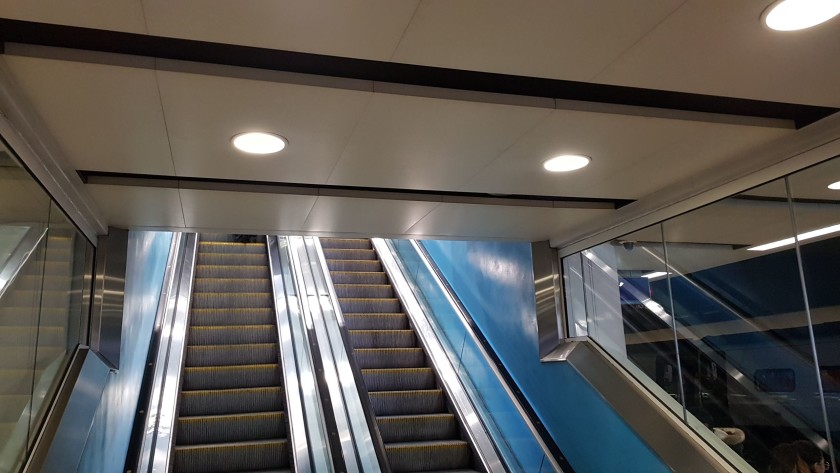
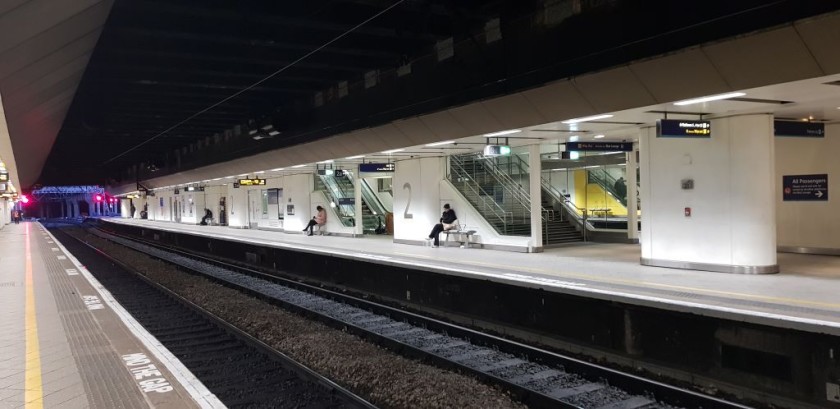
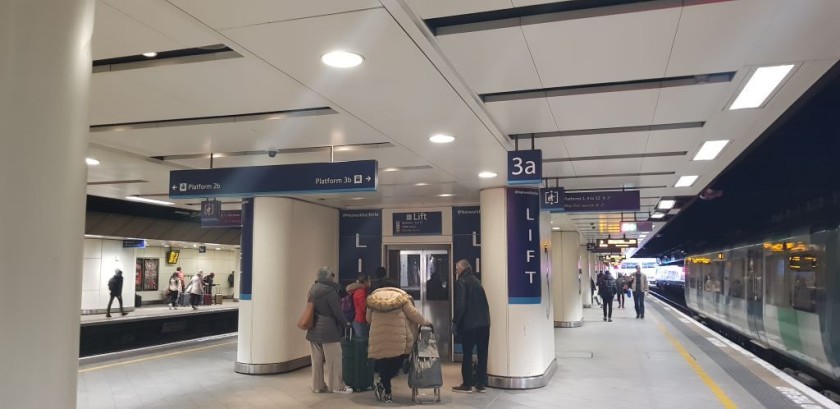
Two sets of escalators, two lifts (elevators) and a staircase connect platforms (tracks) 2 to 12 to the main concourse, which is home to all of the main exits from New Street station.
The exception is platform 1 - it only has escalators at its 'a' end.
So don't assume that you have to use the first exit that you'll see, because there will be four, or typically five, means of accessing the main concourse.
This is particularly worth keeping in mind if your train arrives at the ‘b’ ends of the platform - because there are no stairs in these ‘b’ zones, so queues can build up for the escalators and elevators at this end of the station
But steps away, at the other ‘a’ end of the platforms, you’ll find a staircase; as well as another escalator and an alternative lift (elevator).
If you don't mind using the stairs, heading down to the 'a' ends of the platforms to find them, can often be the quickest route to the main concourse.
At the 'b' ends of the platforms there also stairs which lead to alternative exits from the station on Hill Street and Navigation Street.
To the city centre:

If you are heading to heart of the city centre, it’s likely that you’ll want to you use the exits on to Stephenson Street.
To the left of this exit is the Local Transport information office, which can be a big help with working out which local bus route (line) will take to your final destination and which stop it will be leaving from.
Though it's worth checking the route to your final destination in the city as there are three main exits from New Street station.
The main entrance to the station is just off Smallbrook Queensway, opposite the Bullring Shopping Centre.
Though if you want to head into the Bullring, there is a covered walkway available from Level 1 in the Grand Central shopping Centre.
If you will be heading to the areas around the canals in Birmingham, it's likely that the quickest route will be to take the Southside exit on to Station Street.
At this exit you don't have to use the stairs - from the top of the stairs you can head to the right, by the Wetherspoon's pub, to find the lift down to street level.
Although some destinations in the city are most easily accessed from New Street by local train – University station lives up to its name with access to the University of Birmingham and Bourneville station is by Cadbury World.
Book Accommodation
When planning a trip, finding convenient accommodation can be trickier than working out which train to take.
Hence ShowMeTheJourney has partnered with the innovative accommodation portal, Stay 22, to offer three options for discovering your optimum accommodation:
1: Use the map above to see which hotel rooms and Vrbo rentals, with easy access to Birmingham New Street, are available.
2: Or click on these cherry-picked properties, offered by Stay 22 partner Booking.com, which are by Birmingham New Street and have been selected on the basis of high guest ratings:
3: Or see what's available with Stay 22's accommodation partners; which include, Expedia, Hotels.com and Trivago - by clicking the large button below.
Stay 22 will 'shuffle' the booking services so that you can be automatically directed to its partner that currently has the optimum availability at this location.
Changing Trains at Birmingham New Street
If you will be changing trains at Birmingham New Street, check the departure summary screen that you’ll find by the escalators on each platform (track).
If you are in luck you may be able to wait on the same platform (track) for your next train to depart.
Arriving at the 'b' end of a platform:
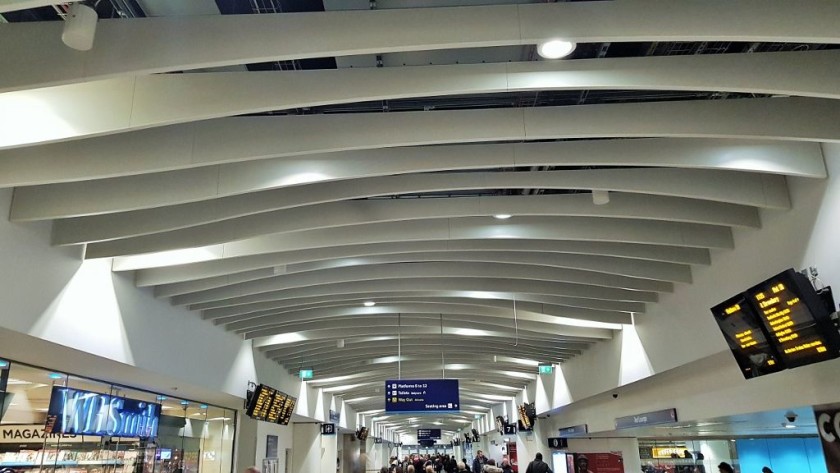
If you have arrived at the ‘b’ end of the platforms and you need to access another platform to catch your onward train, use the exits up from this end of the platform – even if your onward train will be departing from an ‘a’ platform, such as 6a or 10a.
You will ascend into the ‘Red Lounge’ passage way which spans the station and from here the escalators and lifts lead to the ‘b’ ends of ALL the platforms (tracks) in the stations, but you can also walk along any of the platforms to access the ‘a’ sectors if need be.
Arriving at the (a) end of a platform:
However, if your train has arrived at an ‘a’ platform, how you can make your way to your connection is dependent on whether you have, OR haven’t been, issued with a separate ticket(s) for the other train you will be taking on from New Street.
(1) If you HAVE been issued with separate tickets it doesn’t matter how you make the transfer to your onward train.
Use the exit points from the ‘a’ ends of the platforms to go up to the main concourse and if you want or need to go through the ticket gates to access another platform, or to access the shops etc, you can do so.
The separate ticket(s) for your next journey, will then open the subsequent ticket gate you’ll pass through, when you make your way to your onward train.
OR
(2) If you HAVEN'T been issued with separate tickets, it’s best to avoid having to pass through a ticket gate when changing trains.
That’s because the ticket will only open one set of gates - and it’s how the ticket gates are configured in New Street station, which is at the root of this necessarily convoluted explanation below.
If your train has arrived at platforms 1a – 12a, the best option in this scenario, is to ignore the exits at the ‘a’ end of the platforms (tracks) and instead walk along to the ‘b’ ends of the platform and use the exits at that end.
From there you can ascend up into a passage way which gives access to ALL the other platforms, without having to pass through a set of ticket gates.
So if your train has arrived at a ‘b’ platform, the best option is to use the nearest exit to access your onward connection.
To Birmingham Moor Street station from New Street station
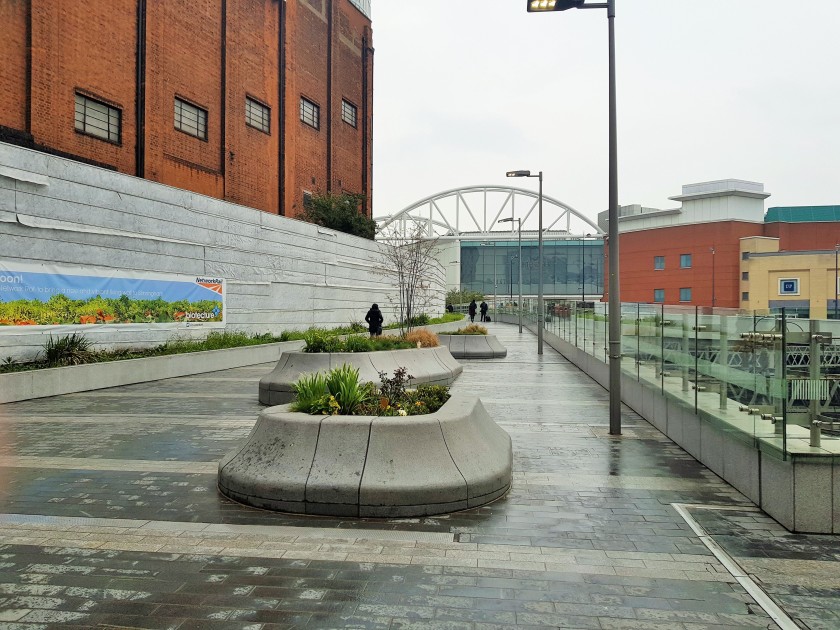
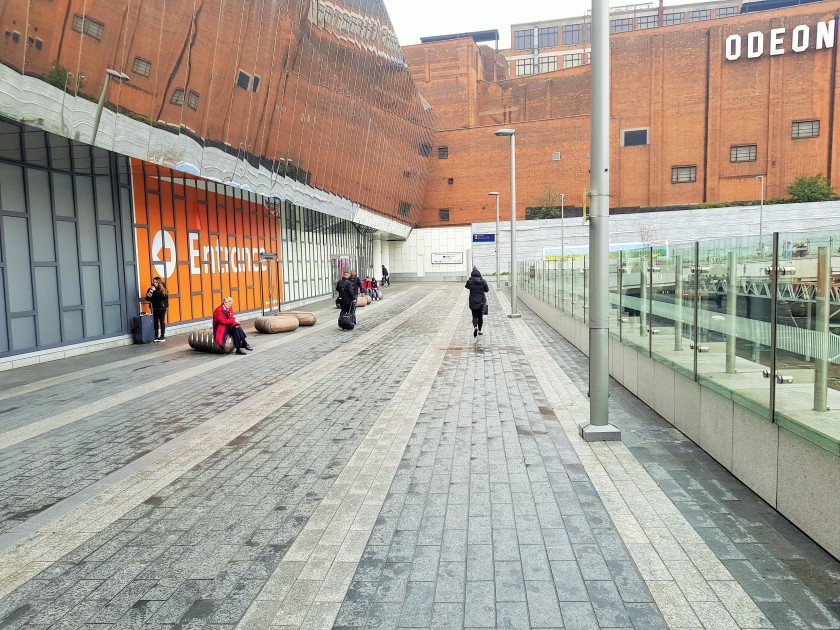
Not all trains from Birmingham call at New Street station, the trains to destinations including Kidderminster for the Severn Valley Railway, Stratford Upon Avon and Warwick, depart from Moor Street station instead (they also depart from Snow Hill station)
Moor Street is only a 5 – 8 min walk away from New Street on a route through the city’s main shopping area, it’s well signposted, but it isn’t step-free.
From New Street the optimum route is:
(1) Use the main exit from the station which leads on to Smallbrook Queensway.
(2) Turn sharp left as you come out of the station and walk across the front of the station – in effect you will be on a path on a bridge which spans the railway tracks.
(3) Then turn sharp right and you will be on pedestrian pathway, appropriately named Moor Street Link.
(4) At the far end of the path you will see a short flight of stairs, you need to ascend these and go straight ahead up the sloping path, which leads into to the city centre.
(5) At the end of this path you will be in a pedestrian shopping area. Ahead of you, curving around to the right, will be a wide path leading into a shopping mall.
(6) Take this path, but before you come to the mall, on the left you will see another path which slopes down between the stores; it has green painted fences on either side of it and white columns.
(7) The path will bend round to the left by a road, which is on the level below, and steps lead down to this road.
(8) When you are back down at street level, you will be at a road junction (an intersection) and Birmingham Moor Street station is the charming older building across the street – you may mistake it for a museum, but it is a station.
OR the other option – which is step-free, but a tad grim:
(1) Use the main exit from the station which leads on to Smallbrook Queensway – towards the Bullring.
(2) Go straight ahead until each the main road.
(3) Cross this road and turn left following the road into a short tunnel under some buildings.
(4) When you emerge from this tunnel, Moor Street station is across the street.
Birmingham Airport by train
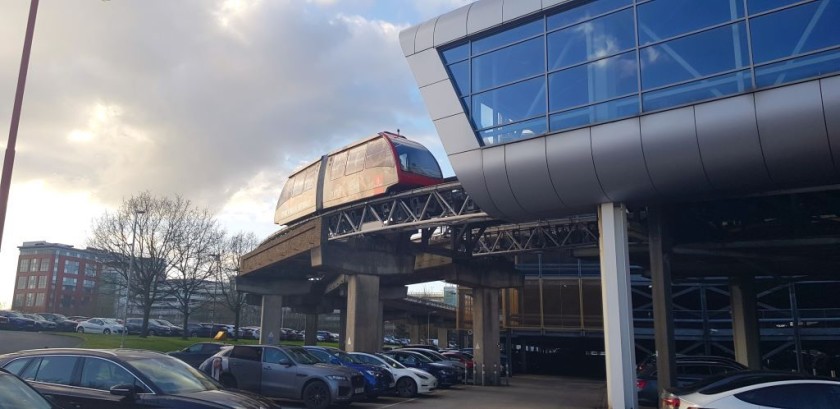
Up to eight trains per hour depart from Birmingham New Street to Birmingham International station, which is connected to Birmingham Airport by a free people mover system, the Air Rail shuttle, which departs every 5 to 10 mins daily from 03:30 to 00:30.
All of these trains typically depart from platforms 1 to 5 at Birmingham New Street, so they can be accessed by using the Blue zone within the station.
Two or three trains per hour will terminate at Birmingham International and it can be a good idea to take your time and target these trains, as they tend to be less busy.
At busy times, seats can be hard to find on the longer-distance trains which travel beyond Birmingham International to Bournemouth and London - so boarding them can be more awkward, particularly when travelling with heavy luggage.
On arrival at Birmingham International the station concourse and its link to the Air Rail shuttle are above the railway and two access points connect the platforms / tracks with the concourse:
- By the front of the trains which arrive from Birmingham, so by the rear of the trains heading to the city, there is a lobby which houses an escalator and a staircase - the escalator leads up from the platforms
- Towards the rear of the trains which from Birmingham, on the other side of a Customer Information booth is the lobby which houses a lift /elevator and a staircase.
Please support ShowMeTheJourney
This second version of ShowMeTheJourney is exciting and new, so we are genuinely thrilled that you are here and reading this, but we also need your help.
We’re striving not to let anything get in the way of providing the most useful service possible, hence a facility has been set up with DonorBox which can be used to support the running costs and make improvements.
Instead of advertising or paywalls, your financial support will make a positive difference to delivering an enhanced service, as there’s a lot of ideas which we want to make happen.
So if you have found the info provided here to be useful, please go here to say thank you.
Journeys
# Jump to a directionDirections
Journeys to Birmingham New Street
Jump to directionsEdinburgh to Birmingham by train
Glasgow to Birmingham by train
London to Birmingham by train
Manchester to Birmingham by train
This second version of ShowMeTheJourney is exciting and new, so we are genuinely thrilled that you are here and reading this, but we also need your help.
We’re striving not to let anything get in the way of providing the most useful service possible, hence a facility has been set up with DonorBox which can be used to support the running costs and make improvements.
Instead of advertising or paywalls, your financial support will make a positive difference to delivering an enhanced service, as there’s a lot of ideas which we want to make happen.
So if you have found the info provided here to be useful, please consider saying thank you.

This is one of more than 100 train travel guides available on ShowMeTheJourney, which will make it easier to take the train journeys you want or need to make. As always, all images were captured on trips taken by ShowMeTheJourney.



